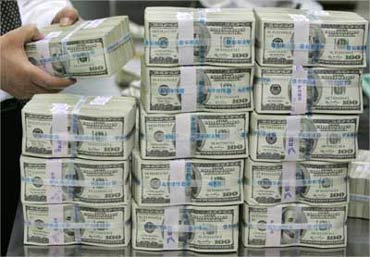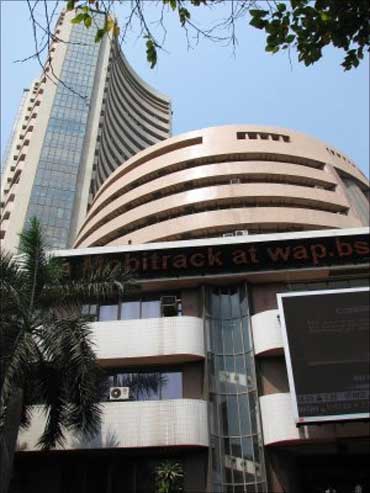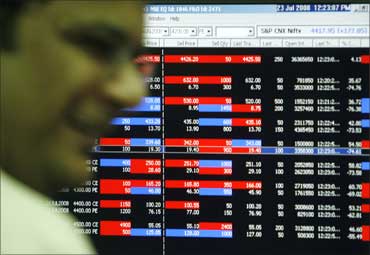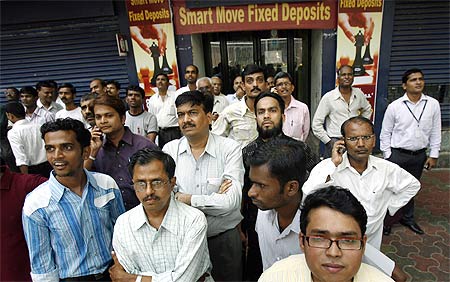Attributing the fall in stock markets in the past few days to selling by FIIs, Finance Minister Pranab Mukherjee asserted on Wednesday that the fundamentals are strong and the economy will clock 8.5 per cent growth in the current financial year.
The volatility in stock market has been on account of 'continued selling by FIIs,' he said, adding that the Indian economy has 'strong fundamentals'.
"While the stock market has its own mind and it take cues from developments all around, I want to take this opportunity to retreat the strong fundamentals of the Indian economy," Mukherjee told reporters in New Delhi.
. . .
FII selling caused Sensex fall, fundamentals strong: Pranab
Image: Pranab Mukherjee.The benchmark index Sensex of the Bombay Stock Exchange had lost 5.90 per cent in the past five trading sessions with investors resorting to hectic selling in wake of Egypt crisis and high inflation etc.
The markets, however, recovered on Wednesday gaining 68 points to close at 18,090.62 points.
The government, Mukherjee said, would stick to the growth projection of 8.5 per cent for the current fiscal.
The economy expanded by 8 per cent during 2009-10 and recorded 8.9 per cent growth rate in the first half of the current fiscal.
"I am confident that we will meet our growth projection for the year. . . (2010-11) will end with a better than projected fiscal balance and more moderate inflation," Mukherjee added.
. . .
FII selling caused Sensex fall, fundamentals strong: Pranab
Image: The Bombay Stock Exchange.Photographs: Reuters
While the price rise had been a problem for the government after the food inflation soared to 18.32 per cent for the week ended December 25, the fiscal deficit is likely to moderate on the back of higher revenue growth and better the anticipated realisation of funds from sale of 3G spectrum to telecom companies.
"There has been fluctuations (in inflation). At one point of time, food inflation went as high as 18.32 per cent. In the large economy like India, these kinds of periodic fluctuation's are not unusual," he said. In the remaining three months, the minister added, "there may be some fluctuations".
Mukherjee said that recent estimates by the Central Statistical Organisation suggested that "the stimulus led recovery in 2009-10 was stronger than earlier believed.
. . .
FII selling caused Sensex fall, fundamentals strong: Pranab
"Growth rate of GDP has been revised from 7.4 per cent to 8 per cent in 2009-10 and from 6.7 per cent to 6.8 per cent in 2008-09".
More importantly, he added, both savings and investment growth have shown strong recovery in 2009-10 over the preceding year.
"This augurs well for sustaining high growth of the economy in the medium to long term," he added.
Referring to the 8.9 per cent growth in the first half of the current fiscal, he said, "(It) has taken the economy back to the pre-crisis growth momentum".
Economy was growing at above 9 per cent before the global meltdown pulled down the growth rate to 6.8 per cent in 2008-09.
. . .
FII selling caused Sensex fall, fundamentals strong: Pranab
The fiscal performance during the current fiscal has been 'very satisfactory', Mukherjee said, adding the gross tax collection up to December 2010 showed a growth of 27 per cent year on year.
Customs and excise duties recorded a growth of 66 per cent and 37 per cent, respectively, indicating that "manufacturing activities is on strong growth path in spite of monthly fluctuations in the index of industrial production witnessed in recent months," he said.
"Both the fiscal and revenue deficits are well below the levels recorded in the corresponding period of the last year.
"While the current fiscal situation has been aided by more than anticipated realisation in non-tax revenues it has also afforded the opportunity to increase plan and other developmental spendings in the course of the year," the minister said.






article